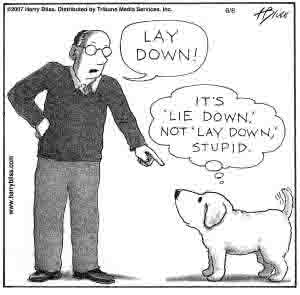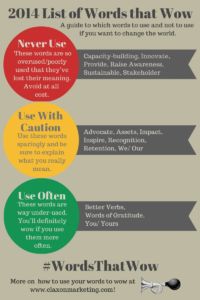 Recently, I’ve been on a verb bender. I mentioned it in this edition of the Claxonette and also in this post. I’ve been asked by some readers to explain what the heck I mean and cough up some gosh darn examples.
Recently, I’ve been on a verb bender. I mentioned it in this edition of the Claxonette and also in this post. I’ve been asked by some readers to explain what the heck I mean and cough up some gosh darn examples.
You see, English speakers tend to obsess about nouns—people, places and things. We worry over our nouns like mothers worry over their newborn babes. We spend so much time making sure that our subjects and objects are the “right ones” that by the time we get to thinking about verbs—you know, like, the thing we want to have happen—we’re exhausted. Our intellectual energy has been zapped.
This obsession with nouns has led to a woeful state of affairs. We are awash in wimpy verbs. To wit, the widespread use of the world ‘provide’.
We provide counseling to at-risk youth.
We provide reading assistance to elementary school students.
We provide legal services to families in transition.
That’s nice. But it’s boring. It doesn’t differentiate you from the gajillion other organizations doing similar work. And that’s no bueno.
Verbs are where it’s at. Their whole job in life is to make something happen. There are thousands of verbs out there just waiting to make stuff happen. They are action-oriented little buggers, skillful in the art of persuasion. Why settle for a boring, over-used verb that will do nothing to help you stand out from the crowd and stick in people’s minds and hearts when a fabulous verb is anxiously waiting its turn to help you out?
Pick your verbs and the nouns will follow.
And now some examples. Because a core message that works in writing and when speaking is the toughest messaging nut to crack, that’s always where I start. This is the answer to the question: “What does your organization do?” You want it to be concise, compelling and repeatable. You want it to spark a question, not answer all the questions someone might conceivably have. (Repeat after me: essence, not everything.)
Group Health Research Institute
Before: Group Health Research Institute is a non-proprietary, public-domain research institution within Group Health, a health care system based in Seattle, Washington.
After: Group Health Research Institute does practical research that helps people like you and your family stay healthy.
Art with Heart
Before: We heal children’s emotional wounds through expressive, therapeutic books and programs.
After: We create books that use art to help kids heal.
[Note: There’s absolutely nothing wrong with the verb ‘heal’. But this wonderful organization heals kids in such a unique way, they needed to bring that front and center so people would know how they heal. That’s their secret sauce.]
NW Biosolids Association
Before: We are a regional non-profit whose aim is to find safe and beneficial ways to utilize bio-solids in forestry, land restoration, reclamation, agriculture and landscaping.
After: We find the best ways to recycle what you put down your drain.
What verb best describes what your organization does?
 [This is the latest installment in our#WordsThatWow series. You can read the others here and you can download the infographic here.]
[This is the latest installment in our#WordsThatWow series. You can read the others here and you can download the infographic here.] Recently, I’ve been on a verb bender. I mentioned it in this
Recently, I’ve been on a verb bender. I mentioned it in this